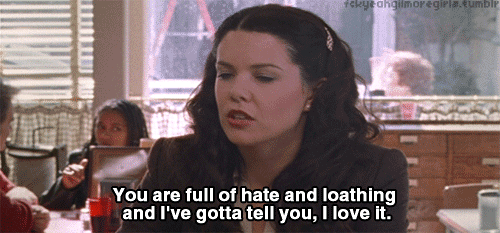In my early 20s, I lived in a house with four wonderful women. We were all theatre artists, had all moved to DC after graduating college, and were all working different survival jobs while we pursued our dreams. We kept each other sane: cheered each other on through success, consoled each other through challenging times, and hosted the best parties.
There was, of course, a fly in the ointment.
My roommates, all of them, loved The Gilmore Girls. Not just
liked it. Loved it. Many a Saturday morning was devoted to binge-watching whole
seasons of the TV show, enjoying the heart-warming and witty banter of its
protagonists as they lived their lives in the mystical and Hallmark-esque town
of Stars Hollow, Connecticut. Saturday mornings being a great time for lazy
camaraderie, I would frequently try to join these watching sessions.
Here’s the thing. I hate The Gilmore Girls. That might not
be strong enough. I loathe them. I despise them. Even just thinking about the
show, I find myself getting riled up.
 Which is fine, right? It’s a TV show. My friends love it. I
don’t. That should pretty much be the end of it.
Which is fine, right? It’s a TV show. My friends love it. I
don’t. That should pretty much be the end of it.
It’s not. My emotions about the show don’t allow me to have
a live and let live approach with it. When I learn that a friend loves it, I
become a little irrational about it. How can a person I love find something so
odious to be good? Worse, how can I person I love – how can that person love
something I hate?
All this to say, as I spend time in the rehearsal room this
week, working on our staged reading of ‘Art’
by Yasmina Reza, I am finding some deep resonances to the work. When Marc says
that his sense of self is shaken by Serge’s love of his white painting, I can
hear my own disbelief over a friend choosing to spend time with the denizens of
Stars Hollow.
At this particular moment in our history, though, I don’t
need to look to an early 2000s TV show to see reflections of Marc and Serge
around me. The political arena has poured itself into our personal lives,
shining a light on places of disconnect between us that we never previously
acknowledged. And this new illumination reveals facets of
ourselves that make us uncomfortable.
If I’m who I am because I’m who I am, and you’re who you are because you’re who you are, then I’m who I am and you’re who you are. But if I’m who I am because you’re who you are and you’re who you are because I’m who I am, then I’m not who I am, and you’re not who you are.
~Ivan
A friend of mine recently posted to Facebook that he was so
distraught at learning a friend of his voted for Trump that he was
re-evaluating both the friendship and his sense of who he understood his friend
to be. Other friends – on both sides of the political spectrum – shared their trepidation
about going home for Thanksgiving and the political conversations that would arise
over the holiday dinner table. In dialog, on social media, and in comment
threads of news articles, we can see the gap between who we think we are and
who our actions reveal us to be.
In ‘Art’, Serge
has bought a painting Marc hates, and it drives a wedge between them. Absurd?
Yes. But very very familiar as well.
How do we engage with those closest to us about differences
of belief in ways that continue and deepen our relationships rather than shattering
them?
Join us this weekend as we tackle this tough, funny, absurd, entirely human play.
Join us this weekend as we tackle this tough, funny, absurd, entirely human play.
 |
| 'Art' plays Dec 2 at 7pm and Dec 4 at 2pm in the Stonington Opera House. Each performance will be followed by a community conversation. |







